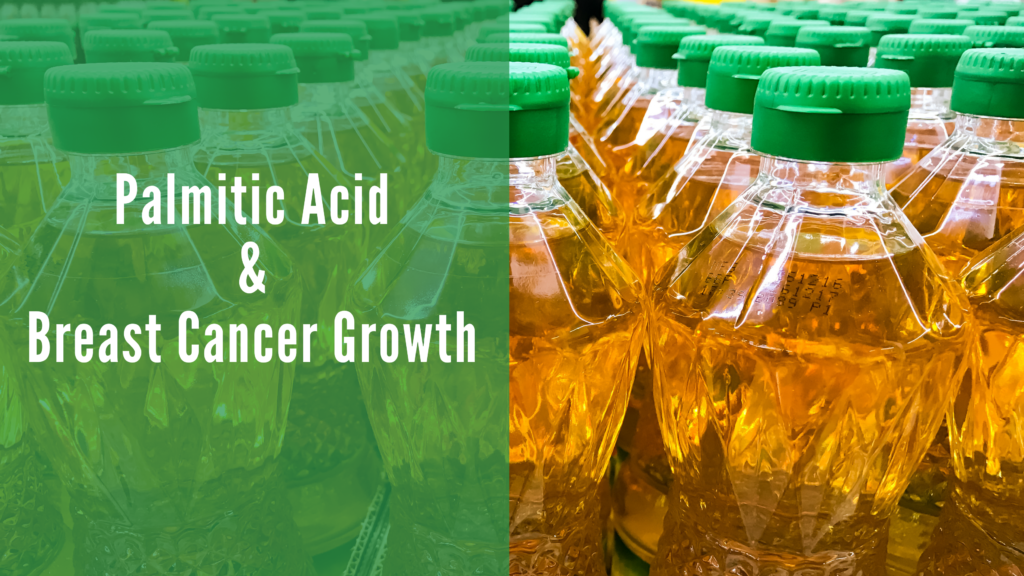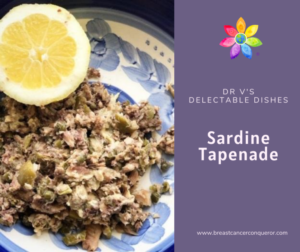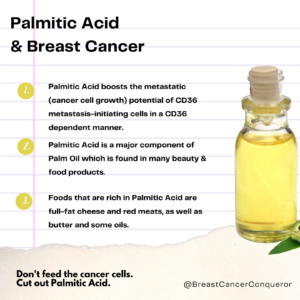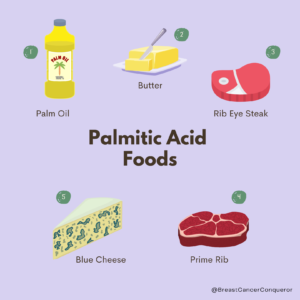
At a Glance:
- A protein called CD36, found in cell membranes of tumor cells, is responsible for taking up fatty acids (Palmitic Acid). It is a general marker of metastatic cells.
- Some foods that contain Palmitic Acid are full-fat cheese, meats, and some oils.
- Cutting out Palmitic Acid from your diet can prevent the spread of cancer cells.
- Recipes to try Sardine Tapenade.
- ProductsWithoutPalmOil.com is a great website to research home, skin, and food products free of palm oil.
What does Palmitic Acid have to do with Breast Cancer?
New research shows that the metastatic process (cancer spread) is enhanced by fat intake. This study identifies for the first time a protein called CD36, which has an essential role in cancer spreading. CD36 is responsible for taking up fatty acids. Its dependence on fatty acids distinguishes metastasis-initiating cells from other tumor cells.
In this 2016 study on mice, the mice given a high-fat diet, including Palmitic Acid, developed the most aggressive cancer spread. The team managing the study also found that CD36 was present on metastatic cancer cells in human patients with various tumors. These tumors included melanoma skin cancer, ovarian, lung, bladder, and breast cancer.
“We can state that CD36 is a general marker of metastatic cells, the first I know of that is generally specific to metastasis,” says Professor Benitah, Head of the Stem Cell and Cancer Lab at IRB Barcelona and head of the Worldwide Cancer Research study. “We expect this study to have a big impact on the scientific community and to further advances in metastasis research, and we hope to be able to validate the potential of CD36 as an anti-metastasis treatment. Things like this don’t happen every day.”
The results of the study above were further researched in other studies. A Journal of Cellular Physiology study states, “Most breast and other cancer cell types are addicted to fatty acids (FA), which they require for membrane phospholipid synthesis, signaling purposes, and energy production.”
A study by Nature found that “Palmitic Acid or a high-fat diet specifically boosts the metastatic potential of CD36+ metastasis-initiating cells in a CD36-dependent manner. The use of neutralizing antibodies to block CD36 causes almost complete inhibition of metastasis in immunodeficient or immunocompetent mouse models of human oral cancer, with no side effects.”
All of this to say, fatty acids such as Palmitic Acid (palm oil), help spread cancer cells.
What is Palmitic Acid?
Let’s start with some history. Palmitic Acid is also known as hexadecanoic acid (16 carbon atoms). It is the most common saturated fatty acid found in animals, plants, and microorganisms. In 1840 Edward Frémy first studied it in saponified palm oil, from which Palmitic Acid got its name. It is a major component of palm oil which is sadly found in many beauty products and foods.
Palmitic Acid Products
Palmitic Acid is found in many skincare and cosmetic formulations. It improves the texture of products and helps trap moisture in the skin. The human body also naturally creates Palmitic Acid. When our body contains an excess of carbohydrates it converts them into Palmitic Acid and then stores them as fat. The stratum corneum of the skin also contains Palmitic Acid. It is the upper layer of the skin that is held by the natural oils our skin produces. This layer protects the skin from moisture loss, bacteria, and allergens.
When searching for skincare products, try to find products that do not contain palm oil, Palmitic Acid, or its other name of hexadecanoic acid. For those of us healing and preventing cancer, this is not something we need to be lathering all over our porous skin that seeps throughout our bodies.
Additionally, palm oil harvesting contributes significantly to deforestation, threatening biodiversity and wildlife. Usually, if something is bad for our planet, it is bad for you!
Palmitic Acid Foods
Some foods that contain Palmitic Acid are:
- Full-fat cheese (cheddar, Swiss, blue cheese, etc.)
- Butter
- High-fat red meat (rib eye, NY strip, prime rib. etc.)
- Some oils: palm, corn, soy, and sunflower
ProductsWithoutPalmOil.com is a great website to research home, skin, and food products free of palm oil.
Recommended Foods to Eat
To counter, here are some alternative foods that contain heart-healthy and cancer-fighting fats.
- Nuts and seeds (almonds, walnuts, cashews, pumpkin and apricot seeds, etc.) are also high in protein and fiber and an excellent source of healthy fat. Nuts are truly superfoods on your Healthy Breast journey. Learn more about them here!
- Olive oil olives should be a staple in your kitchen. It is a good source of monounsaturated fat, which studies have shown could reduce a woman’s risk of breast cancer. Researchers have also discovered that an ingredient found in the oil─ oleocanthal─can kill cancer cells. Oleocanthal is a compound that ruptures a part of the cancer cell wall. On top of the cancer-killing benefits, olive oil is anti-bacterial, can reduce inflammation, and it contains a plethora of vitamins and nutrients. When choosing an olive oil to add to your pantry, make sure it is organic, cold-pressed, and extra virgin olive oil (EVOO). The greener the better for extra freshness and purity. Moderate amounts of monounsa
 turated fats are an important part of the “7 Essentials System™” for healing the body naturally and healthy. An organic extra virgin olive oil should be a part of every healthy breast diet protocol.
turated fats are an important part of the “7 Essentials System™” for healing the body naturally and healthy. An organic extra virgin olive oil should be a part of every healthy breast diet protocol. - Omega-3 fatty acids is a fatty acid that I highly recommend! It can be found in a supplement, walnuts, chia seeds, sardines,salmon, etc. “Omega-3 PUFAs play essential roles in cell signaling and in the cell structure and fluidity of membranes. They participate in the resolution of inflammation and have anti-inflammatory and antinociceptive effects.” I order my sardines from safecatch.com, and if you use code “DRV” at checkout you will get 20% off your first order!Use them in this delectable Sardine Tapenade. It will change your outlook on sardines!



Do we know if the source of meat matters ? Does grass fed beef have the same palm oil as commercial?
That is a good question! Since the other constituents of grass fed beef are different than commercial, I would think that the palmitic acid would be of better quality in grass fed as well.
This is very interesting and brings about a concern regarding the high palmitic acid content of coffee. Do we have to be concerned when using coffee enemas and its effect on cancer cells and possible metastases? My “Gerson approved” organic enema coffee says, “high palmitic acid.”
Hi Mel!! Just like there are “good fats” and “trans fats”, the same can be said for palmitic acid. When it is in something that is highly refined… no good. When it is not very refined (as with S.A. Wilson coffee)… all is ok!
Would coconut/palm sugar fall into the palmitic oil category? And is flaxseed just as recommended for Omega3s as would be Wild Alaskan salmon oil supplements?
Palmitic acid is found in oils, not in the palm sugar. Flaxseed and salmon oil are great sources of Omega 3s!
Dr. V – what about Ghee? always thought small amts of ghee were ok, but????
Yes ghee is fine… and yummy!
Is fresh coconut water and coconut flesh be recommended?
SURE! Fresh is great!
Following the recent research confirming the metastatic action of palmitic acid on cancer, I am concerned about the use of coffee enemas. The palmitic acid in coffee promotes activity of the antioxidant enzyme glutathione S-transferase but could it be promoting metastasis at the same time? I would appreciate your input – I hesitate to do any more coffee enemas until clear about this.
Hi Gail! The palmitic acid that is used in processed and commercial foods is what we need to be concerned about – not the naturally occurring one…it’s kind of like olive oil is good for you, but if you use it to fry, you make trans fats which are detrimental to health.
The antioxidant enzyme glutathione S-transferase is beneficial but large amounts (like taking a glutathione IV) may or may not be. SOME cancers can use it for food. You can find out through an RGCC test (Onconomics Plus test)
Natural stimulation of glutathione through diet or coffee enemas should not be a concern because there have been decades of Coffee enemas on thousands of people that have not proven to be problematic….
But, always listen to your gut and if YOU feel uncomfortable doing them, discuss this with your physician